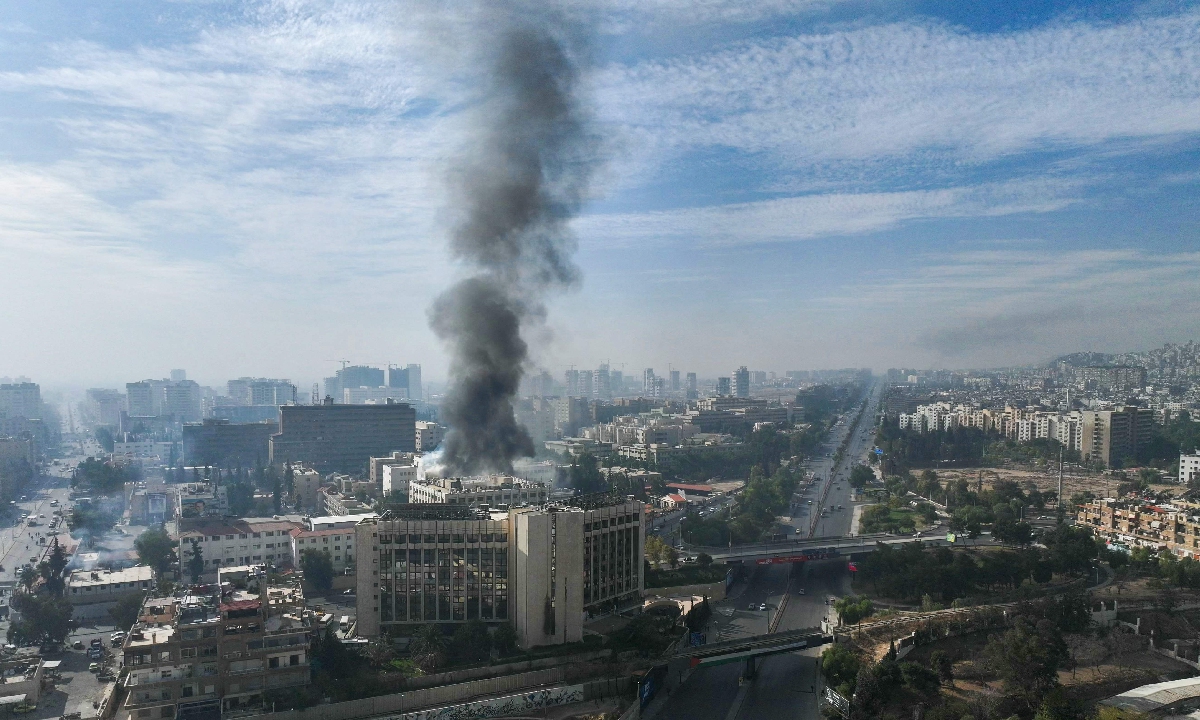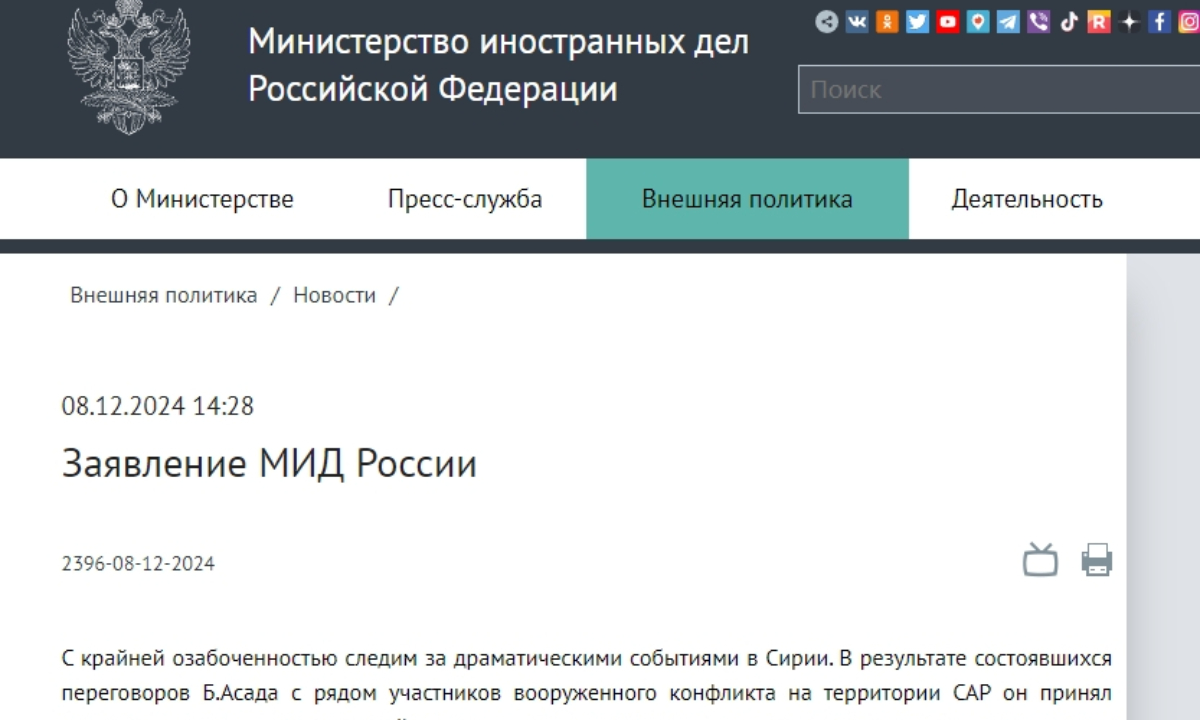Syria's sudden change shocks the world, ‘might worsen chaotic Middle East situation’

This aerial photo shows smoke billowing from a building in Damascus on December 8, 2024. Rebels declared that they have taken Damascus on December 8. Photo: VCG
The Chinese Foreign Ministry said on Sunday that China is closely following the situation in Syria and hopes that stability will return as soon as possible. The situation in Syria has undergone dramatic and astonishing changes as opposition forces took over state television channels on Sunday to announce what they described as the fall of Damascus and the end of President Bashar al-Assad's government.
Syria's situation has undergone a sudden change over the weekend. On Sunday, reports indicated that opposition forces entered the capital city Damascus and that Assad had left the country, although there was no official confirmation.
"The Chinese government has been actively helping Chinese nationals who wish to leave the country to do so in a safe and orderly way, and staying in contact with those Chinese still in Syria and offering them advice on how to stay safe. We urge relevant parties in Syria to ensure the safety and security of the Chinese institutions and personnel in Syria. The Chinese Embassy is still up and running and carrying out its duty in Syria. We will continue to make every possible assistance to Chinese nationals in need," the Chinese Foreign Ministry said in a statement on Sunday.
The fast-moving situation has caused astonishment around the world, with regional countries and major powers alike were seemingly unprepared for the abrupt change in Syria.
Over the past few days, the situation in Syria has undergone rapid and dramatic changes. On Sunday, the Russian Ministry of Foreign Affairs announced that following his talks with a number of participants in the armed conflict in the Syrian Arab Republic, Bashar al-Assad decided to step down as the Syrian President and leave the country, instructing the government to transfer power peacefully, according to a statement from the Russian Ministry of Foreign Affairs on Sunday.
Syrian opposition fighters announced a curfew in Damascus on Sunday, effective from 4 pm (1300 GMT) to 5 am local time, following their capture of the Syrian capital that led to the collapse of President Bashar al-Assad's government, Xinhua News Agency reported.
Syria's fate is the sole responsibility of the Syrian people and should be pursued without foreign imposition or destructive intervention, Iran's foreign ministry said on Sunday in a statement, which also said that the relations between the two nations of Iran and Syria have a long history and have always been friendly, and it is expected that these relations will continue, according to CCTV.
Iraq's official news agency reported that the Iraqi embassy building in the Syrian capital has been evacuated, and staff have been moved to Lebanon. This comes after Iraq closed its border crossing with Syria, and the Iranian embassy in Damascus was stormed by members of the Hayat Tahrir al-Sham (HTS) rebel group, Al-Jazeera reported.
Russia, Iran, Turkey, Iraq, Egypt, Jordan, Saudi Arabia and Qatar have issued a joint statement calling for a "political solution" to the Syria issue in the capital of Qatar Doha, the Xinhua News Agency reported on Sunday.
On Saturday, the foreign ministers of Russia, Turkey and Iran held talks in Doha to discuss Syria, calling for an end to the war as soon as possible. After the meeting, the three countries together with the five Arab countries issued a joint statement that expressed concern over the threat the Syria crisis could cause to the region and international security.
According to Al-Jazeera, HTS is the biggest fighting group in operation Deterrence of Aggression launched by rebels in November. Formerly Jabhat al-Nusra, then Jabhat Fateh al-Sham, it is a group of allied factions, including Jabhat Fateh al-Sham, Liwa al-Haqq, Jabhat Ansar al-Din and Jaysh al-Sunna.
At the start of the Syrian war, Jabhat al-Nusra was formed in 2012 by ISIL (ISIS), from which it split a year later and declared allegiance to al-Qaeda. It severed ties with al-Qaeda and joined with other factions to rebrand as HTS in 2017. HTS in effect controls Idlib and is estimated to have up to 30,000 fighters, Al-Jazeera reported.
Chaotic situation
Multiple media outlets reported that Assad has already left the country, citing opposition forces. The Syrian presidency had said on Saturday that Assad was still performing his constitutional duties in the capital, Xinhua reported on Sunday. Xinhua reporters in Damascus witnessed intense gunshots reverberating through the streets with heavy traffic caused by cars departing the capital.
A video showed Syrian Prime Minister Mohammad Ghazi Al-Jalali being escorted by opposition forces in Damascus on Sunday, purportedly to a hotel to hand over government authority, according to CNN news.
Jalali said the government was ready to "extend its hand" to the opposition and turn its functions over to a transitional government, the Associated Press said.
Jalali earlier told a Saudi-owned news channel in a phone interview that he last spoke with Assad on Saturday, but had not been able to reach him since. The opposition forces that entered Damascus have said they will work with Jalali.
Earlier on the day, two Syrian sources told Reuters that Assad was believed on a plane took off from the Damascus airport around the time it was reported that the capital was taken by the rebels. The plane then made a surprising U-turn and disappeared from the map. There is no official confirmation of the information.
Abu Mohammad al-Julani, leader of the HTS rebel group, has prohibited his forces from approaching public institutions, stating that they will remain under the supervision of the country's prime minister until they are officially handed over, according to a statement published on the group's social media outlets, Xinhua reported. He also banned his fighters from opening fire in the air.
Later on Sunday, opposition forces in Syria took over state television channels to announce what they described as the fall of Damascus and the end of Assad's government. A man in military fatigues, flanked by armed fighters, read the statement on air, calling it "Statement No. 1." He claimed that rebel units had captured Damascus, according to Xinhua.
Xue Dan, Global Times reporter who evacuated from Syria on Saturday, said that the situation worsened starting Thursday, with the Chinese embassy urgently informing Chinese nationals to leave the country. "On Saturday morning, two Chinese journalists and me left from a hotel in Damascus," Xue said. They all headed to Lebanon.
At that time, order within the Syria's capital city was normal and Xue said he witnessed what appeared to be foreign military vehicles on the roads, and people lining up at the port.
"Residents in Damascus are deeply concerned about the situation going out of control, the currency is devaluing sharply, and people have rushed to markets to buy food and other materials for daily life," Xue noted.
What will happen next?
Li Xinggang, a research fellow at the Institute for Studies on the Mediterranean Rim at Zhejiang International Studies University, told the Global Times on Sunday that Syria is highly likely to fall into long-term turmoil in the future. "Because different regional armed forces have different goals and demands in the highly complicated Syrian issue. Assad's government cannot withstand the current change, and no power can build up new order or create a new balance of power immediately," he said.
For a long time, multiple foreign forces have been supporting Syrian anti-government forces to weaken and fight the Assad regime, with US troops still occupying oil fields and key transportation routes, which have seriously damaged Syria's reconstruction process and economy, Li noted.
Wang Jin, an associate professor at the Institute of Middle Eastern Studies at Northwest University in Xi'an, told the Global Times on Sunday that "economic problems are the fundamental reason. Syria used to have reliable military forces to make sure the situation remained essentially under control, but economic problems have undermined the country's ability to maintain military strength, which is why the government forces fled or surrendered quickly."
"Since the outbreak of the latest round of Israeli-Palestinian conflict last year and the Russia-Ukraine conflict, as well as the recent conflict between Hezbollah and Israel, Assad's key allies have all been undermined and are unable to provide enough support to defend the regime, enabling opposition forces to seize the major cities in such a short time," Li said.
The future will be highly unpredictable, as this depends to what extent the armed groups within the country can agree on a political solution. If they fail, there could be renewed civil war. Coordination and communication between foreign military troops of the major powers and regional powers like the US, Russia, Iran and Turkey are also important, Wang said, adding that Kurdish forces and Israel could influence the outcomes.
Song Zhongping, a Chinese military expert and TV commentator, said "another concerning problem is that there might be terrorists and extremists fish in troubled waters in the country, and now they will have weapons and resources left by Syrian government forces, potentially enabling them to conduct more attacks within and outside the region. The situation desperately needs efforts and consensus not only within the country, but also among the international community to restore peace and order."



